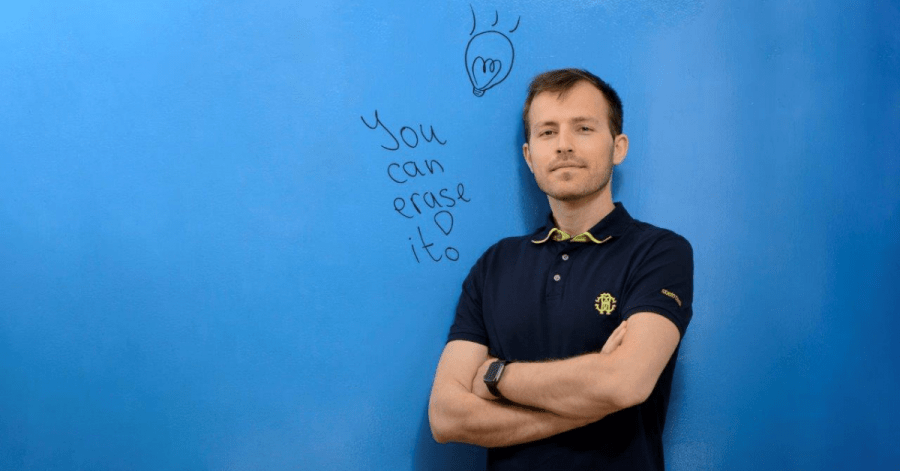He is an artist, a passionate traveler, and a devoted partner. He gets inspired by nature and likes books about psychology and its role in improving the working environment. One of his big aspirations was to create a language of emotions, which would be used for understanding emotional intelligence in the context of work productivity and how to push people to upscale their professional boundaries. His name is Iskren Mitev and he is the co-founder and chief innovation officer at Escreo – a Bulgarian whiteboard paint startup that enables its customers to turn their home and office workspace into a creative place through its ‘write-on walls’ paint technology.
Established in 2015, Escreo has been developing its office productivity business to raise a total of €121K from local and international angel investors and VCs, such as Eleven Capital and 3P1. The startup was featured in Deloitte’s “Technology Fast 50 Central Europe 2020” ranking as one of the rising ‘Impact Stars’ of CEE.
Exploring our work-life balance series, The Recursive met with Mitev to talk about the importance of emotional intelligence in the workplace and understanding how you, your employees, and colleagues feel.
The identity problem
For Mitev, the path of startup founders towards reviving emotional intelligence is understanding the extent to which they associate themselves with their venture “Every business is a matter of identification – when you start it, the environment and the contacts you make become an identificator of who you are. The self-identification statement “I am Iskren from Escreo” blurs the borders between the identity of the startup founder and the partner, friend, and coworker I am. Emotional intelligence is crucial for understanding how to reverse the process and learn to balance the different roles you are in charge of, both personally and professionally,” Mitev believes.
The startupper vs the partner
For Mitev, balancing a startup with one’s romantic relationship goes down to a simple thing: communication. “It is common for founders to mix up their work and private life. In the startup world, one is encouraged to give the maximum effort and pour in as much personal time and resources as possible. This has the potential to ruin a relationship, especially when not communicated properly with the partner,” he adds.
The co-founder shared that a nurtured romantic relationship can be a source of happiness but also a valuable asset for every startup founder “A partner is your safe zone, the person with whom you can experiment with different communication styles, and the one that can teach you how to be emotionally intelligent and reciprocal in your relationship. If one learns to communicate effectively in his relationship, he can naturally spin-off this type of communication in his workplace, when talking to colleagues, partners, and clients,” Mitev says.
5 tips on building emotional intelligence at work and in life
#1 “When starting your venture or scaling it to the next stage, make sure to talk with your partner beforehand and explain to them how much of your time you will need to give to the business.” Not every partner is ready to deal with the psychological pressure of staying in a relationship with a person who is highly committed to their business. When this is the case, not engaging in a discussion to conclude the relationship status would ultimately lead to a bitter end, Mitev explained. “When you isolate a partner or a close one from your parallel life as founder, they slowly become more distant as you set off on two different paths. A constructive conversation could be key for taming the feeling and keeping it under control.”
#2 Allow yourself to connect through vulnerability and emotions.
From Mitev’s experience, trying to frame your behavior or reactions in order to represent your position in the relationship is a limit, which can harm the connection a founder is trying to establish. “I remember abstaining from actively participating, drinking, and even dancing during an Escreo team building and doing my best to maintain the reputation of a strict co-founder in front of my employees and even blaming my co-founders for doing the opposite.
I was afraid that I might look silly or foolish in their eyes and need to keep it cool in order to have their respect. It actually had the opposite effect as it created distance and stopped me from truly getting to know the people I work with on a daily basis. On a bigger scale, it prevented me from understanding who they are, what they believe in, and what they need to feel good at the company, stick to it and be as productive as they can.”
The lack of a healthy relationship and proper communication with the people in your micro startup ecosystem can lead to losses, Mitev warned. “Several people, including one of our co-founders left Escreo before we became mindful of the communication problem we were facing and took the measures needed to start building a healthy environment.”
#3 Learn to name and experience your emotions fully. “I have had moments in my life when someone would cry in front of me and I would not react in any way, keeping a stone face. It took me a lot of time to realize my reaction was a result of the fact that I did not understand my own emotions and saw no clear way to communicate them,” Mitev shared. He added that being emotionally engaged in the relationship and the conversation is the first step towards dealing with such situations. “We must break the emotional stereotypes that are rooted in our local culture. The emotional spectrum must not be gender-divided, and all people must feel free to name what they feel and experience it fully. Emotion travels faster than our thoughts – the only way to take advantage of this is to use it to show people how you are going through the situation.”
From the whole spectrum of emotions, anger must be tackled with a lot of caution as it is more of an exception, Mitev believes. “When you are feeling angry, demonstrating it openly to the person on the other side of the conversation can lead to a conflict. As human beings, we are programmed to mimic the emotions of others, ultimately creating a conflict in tense situations.” Startup founders need to deal with the anger themselves, transforming it into a more digestible emotion to express in front of others. “In tough moments we can use the power of rituals – from taking a pause, taking control of our breath, going for a walk, writing what you feel on a paper and tearing it apart, thus letting go of the emotion” Mitev suggests.
#4 Learn to understand and respond to the emotions of others. Managing a conflict or a delicate situation is one of the skills founders, being the face of the company, must master. When the person on the other side of the conversation feels upset about a particular situation, try to understand how they feel, instead of asking for a particular reason, Mitev advised. “It is often that a person cannot identify the root cause of his emotional outburst and asking them why they feel like that will only worsen the situation or pressure them to tell you the first argument that comes to their mind, which often is not the major problem they are dealing with.” The co-founder advised to show care and concern about the other person’s situation and acknowledge their feelings without judging or running ahead of the conversation. “Try to show emotional support, but never fake your response – the other person can feel when you are not sincere and this will only push them away from participating in a constructive discussion,” the Escreo co-founder advised. Moving the conversation outside or in any environment different from the office is also a good strategy, he hinted.
#5 Take full advantage of the changing work dynamics. In Mitev’s view, employees are always a valuable source of ideas on how to improve a company’s working dynamics and communication patterns. “They are the people on the other side of the conversation – with you as a co-founder, with clients and other executives and coworkers. Ultimately, they know the ways in which the environment can be improved for them to be more productive and communicate more clearly what they need and what input they are willing to give,” he said. “In my experience, women are more aware of the emotions they experience and can be the natural creators of a healthy working environment. I cherish the fact that their presence is increasingly noticeable in our ecosystem, as they have the ability and potential to create the right ground for meaningful emotional interactions, moments and conversations that leave a positive footprint in the companies they develop in,” Mitev concluded.








